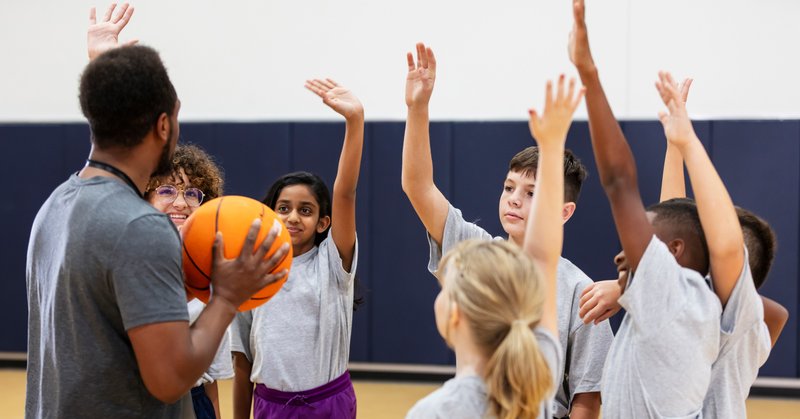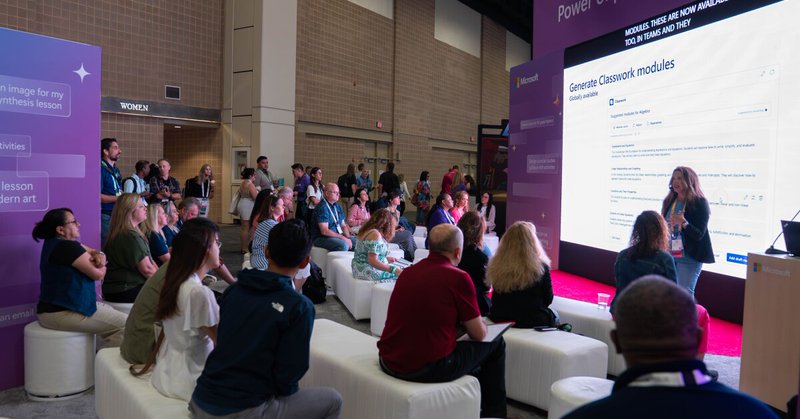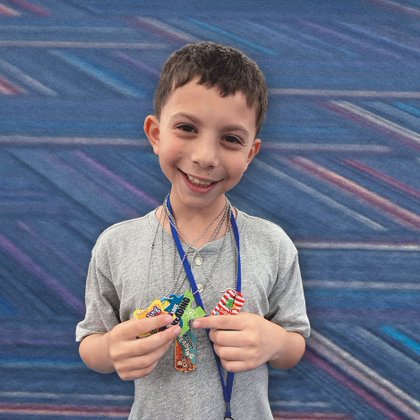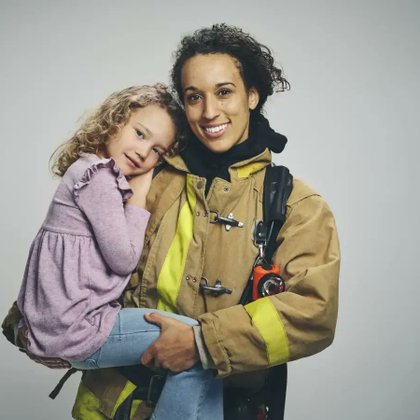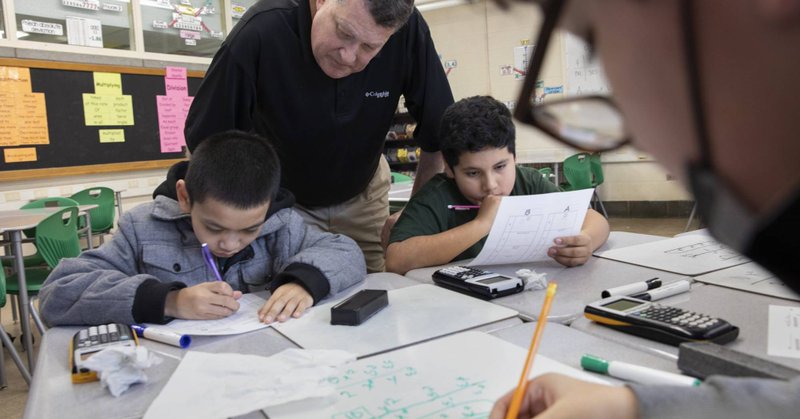
MindShift
@MindShiftKQED
Followers
424K
Following
7K
Media
6K
Statuses
33K
MindShift explores the future of learning, covering cultural and tech trends and innovations in education. Find the MindShift Podcast at https://t.co/fbpQB5xibO
San Francisco
Joined August 2010
🔎 In case you are looking to follow MindShift on different platforms here's where you can find us! 📧 Start with signing up for our newsletter for weekly updates on the future of learning: https://t.co/RzMYgDkiVV
19
24
107
Traci Thomas shares how she chooses books for her young kids, why she rereads her favorites with them, and how her author interviews shaped her reading goals. @callmeKi @thestackspod_
https://t.co/O1qmbLSiTI
kqed.org
We talk with The Stacks Podcast host Traci Thomas about books she hopes to read with her young children when they're older.
0
0
3
Back-and-forth conversations with young children—known as “serve and return”—are critical for their brain development, language, and emotional growth. @hechingerreport @jackiemader
https://t.co/KvnE77PLCn
kqed.org
A growing number of cities, states and individual child care programs are pouring resources into training teachers on the importance of talking to kids as much as possible.
0
2
7
Not all questions are created equal. A good question has purpose, clarity, and sparks deeper thinking. https://t.co/kv31Y4WUAK
0
13
24
6-7 became disruptive enough that some schools tried to ban it. But if you can’t beat ’em — and you really can’t — then join ’em. @Chalkbeat
https://t.co/5NA9K9pNK2
chalkbeat.org
We asked teachers around the country how they’re handling the giggles, shouts, and sometimes intense disruption caused by the 6-7 trend. Here’s what they said.
0
0
4
PE and SEL are a natural match. Here are three tips to help PE teachers build SEL skills into class routines. @edutopia
https://t.co/vuagvphxLS
edutopia.org
PE teachers can foster students’ social and emotional learning by using consistent routines and modeling a focus on mindful breathing.
0
2
3
A report finds offering algebra isn’t enough. The real barrier for many students, especially marginalized groups, is being given the opportunity to take it. @K12DiveNews
https://t.co/oCxCB7iVK4
k12dive.com
About 3 in 5 schools offer algebra in 8th grade, with access much lower in rural areas, high-poverty schools and for Black students in particular, NWEA said.
0
2
1
AI mental health chatbots are filling gaps in school counseling and offering support around the clock. But experts say they’re not a substitute for real human care. https://t.co/hha1TrivjY
kqed.org
With school counselors outnumbered and mental health workers overloaded, can AI chatbots help students with immediate needs without taking the darker turn of AI companions?
2
1
1
Letting students lead investigations helps them feel like they’re truly doing science. Here are a few key things to keep in mind. @edutopia @HannahBradley_9
https://t.co/UvUTNnTHOa
edutopia.org
High school students get the most out of lessons when they receive direct support along with consistent opportunities to explore concepts on their own.
0
1
1
More teachers are getting basic AI training, but @educationweek surveys show ongoing support is still rare. https://t.co/mjr5PmrTdM
edweek.org
AI is now embedded into many of the tools that students and teachers use daily.
0
4
7
A study finds special ed teacher turnover falls into three categories: leaving the field, shifting to general ed or moving to a new school. @K12DiveNews
https://t.co/YwGE4H48GC
k12dive.com
A new study finds that state and local policies need to target not only attrition but also the reasons behind turnover.
0
3
3
Eyal says teens are losing chances to share real vulnerability with peers, while online “vulnerability content” floods them without asking for any true connection. https://t.co/7jJ7hUU1BH
kqed.org
Social media algorithms propel emotional content to the top of one's feed. But what is the impact on the teens who see so much of it?
0
2
3
Students earn “brag tags,” tiny book-themed charms, when they discuss the books they read. A simple, fun way to motivate reading. @sljournal
https://t.co/3zW5Z9UdTW
slj.com
Brag tags and a parent book club created better, more engaged readers at South Park Elementary School in Deerfield, IL.
0
2
6
Many Chicago communities have set up daily watches for federal agents outside of schools. @Chalkbeat
https://t.co/v2M5u9NITm
chalkbeat.org
The mothers, who live and work on the Southwest Side, have made new efforts to provide support to the kids and families they serve in schools who are fearful of the Trump administration’s immigration...
0
0
1
Should you whip out a notebook or a laptop to take notes? The answer is not so simple. @hechingerreport @jillbarshay
https://t.co/MEYUZ5RlF2
kqed.org
A widely cited neuroscience study about the effectiveness of writing by hand over typing on learning is contested.
0
0
0
Experts say teachers should be strategic about how they use tech tools to communicate with parents. @educationweek @AlysonRKlein
https://t.co/rWrTdgP24t
edweek.org
Two nonprofits teamed up to create a toolkit of resources schools can use to help families.
2
2
4
Although much of our understanding of human courage comes from the adult field, one study examined the link between fear and courage in children aged eight to 13. @GreaterGoodSC
https://t.co/Tb9nTJHsgL
greatergood.berkeley.edu
Researchers have examined the personality traits, the brain circuits, and the learnings that lead to children's heroic acts of courage.
0
1
1
With young kids we teach by doing. With teens we support their autonomy, says psychologist Christen Manangan. @ParentMap
https://t.co/qFrpsfnLUZ
parentmap.com
Useful insights and practical tips that help keep kids motivated
0
3
2
A national analysis shows boys don’t perform or behave better with male teachers in elementary school. Benefits may emerge later in middle or high school. @hechingerreport @jillbarshay
https://t.co/BfI3V17HxH
kqed.org
A teacher’s gender doesn’t matter for young boys, national study shows.
0
4
6
Cross-curricular connections in fiction help students see how subjects relate and make learning feel more meaningful. @middleweb
https://t.co/CMzCZmIQlm
middleweb.com
Fiction is a powerful tool to build foundational knowledge across subject areas–deepening understanding and sparking curiosity–says teacher leader Kasey Short.
0
4
6
After school shootings, teachers carry unseen trauma. Many say their needs are overlooked and they struggle to find support. @Chalkbeat
https://t.co/dah7qd6Yzf
chalkbeat.org
“They don't have to be alone with those thoughts or those fears in the aftermath,” said Kiki Leyba, who was teaching at Columbine High School during the 1999 mass shooting.
0
2
5




